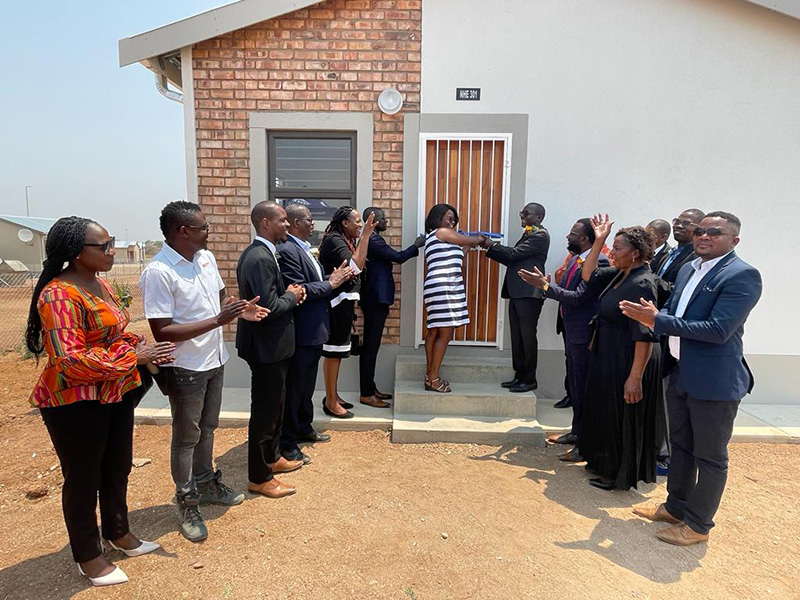The National Housing Enterprise (NHE), tasked with the mammoth mandate of providing affordable housing to the unhoused Namibian masses, is no longer with its former legal secretary and company secretary Ntelamo Ntelamo.
The now previous NHE employee recently resigned in a scathing letter of attack on NHE’s performance and its leadership.
In an internal letter circulated on social media, Ntelamo advised NHE CEO Gisbertus Mukulu that the company’s loan book must be his primary concern and pre-occupation.
“NHE’s sustainability cannot be seen away or separate from the loan book. If the loan book is low and is ever dwindling, NHE is going down without a doubt. The above truth you must know as the CEO. Now, when you know you must do something to improve the situation,” the letter stated.
It continued: “A few houses do not make a dent at the financials, they merely replace the percentage by which the loan book has declined because clients finish paying off their mortgages every day, some are even bought out by commercial banks, because NHE has no exciting products to offer them – an opportunity line NHE has never been able to explore. Banks do not like losing clients even after a client has discharged their obligation, banks want to retain a client on this or that product – otherwise, they will not be in business for very long. As it stands, NHE lives from hand to mouth, clearly why many think transfers take long because NHE depends on the little money the banks must pay in and of course use the money up (sic) as it arrives into its account. This is really unsustainable. To beat it, NHE needs high numbers in housing production. There is no other way because that for now at least, is NHE’s only business.”
In response to queries from New Era, Mukulu stated: “We hereby wish to state that Mr Ntelamo is a former employee of the National Housing Enterprise (NHE). His email communication to the CEO represents his personal views, and not those of NHE. Any internal communication in an organisation is meant for the recipients and not for discourse in the media.”
Meanwhile, according to NHE spokesperson Tuafi Shafombabi, the enterprise has constructed a total of 1 234 houses from 2015 to date. The houses were constructed in Windhoek, Outapi, Oshakati, Karibib, Omuthiya, Eenhana, Okahao, Rundu, Okakarara and Keetmanshoop.
“The above houses were constructed using the RFP (request for proposal) model. Due to the financial constraints, NHE has devised a financial model called request for funding proposals, hence these houses were constructed through a partnership with local contractors /financiers where NHE made land available. One of the key inhibiting factors is the lack of serviced land,” Shafombabi explained.
When pressed for clarity on NHE’s current financial position and how this compares to previous years, the public institution stated: “This is an internal matter and we cannot indulge any information to the media.”
Moreover, Shafombabi noted that the NHE intends to complete 319 houses during the 2022/23 financial year, excluding the Informal Sector Upgrading Programme. Of these 319, some 110 are already completed with a further 209 under construction.
During a recent housing symposium held in Windhoek, urban and rural development minister Erastus Uutoni explained that government is continuing with its Windhoek informal settlement upgrading housing project.
This is a partnership and joint financial investment by the ministry, City of Windhoek, Khomas Regional Council and the NHE, that aims to deliver some 1 200 housing units during phase 2. The first phase saw the construction of 600 houses in Okuryangava, Goreangab Extension 4, Greenwell Matongo D, Otjomuise Extension 8 and 9, and Freedom Land A and B.
Meanwhile, NHE’s strategic overview 2017/18 to 2022/23 indicated that its loan book, which is one of its highest income generating assets, stood at N$500 million. This was projected to grow at least by 15% per annum for the five-year plan and would require more houses to be directly built and financed by the NHE as opposed to credit-linked houses. -ebrandt@nepc.com.na
Caption:
Challenge… While NHE planned to build 1 250 houses in at least four of the last five years, it has constructed only 1 234 houses since 2015.
Source: NHE Strategic Plan 2022/23



